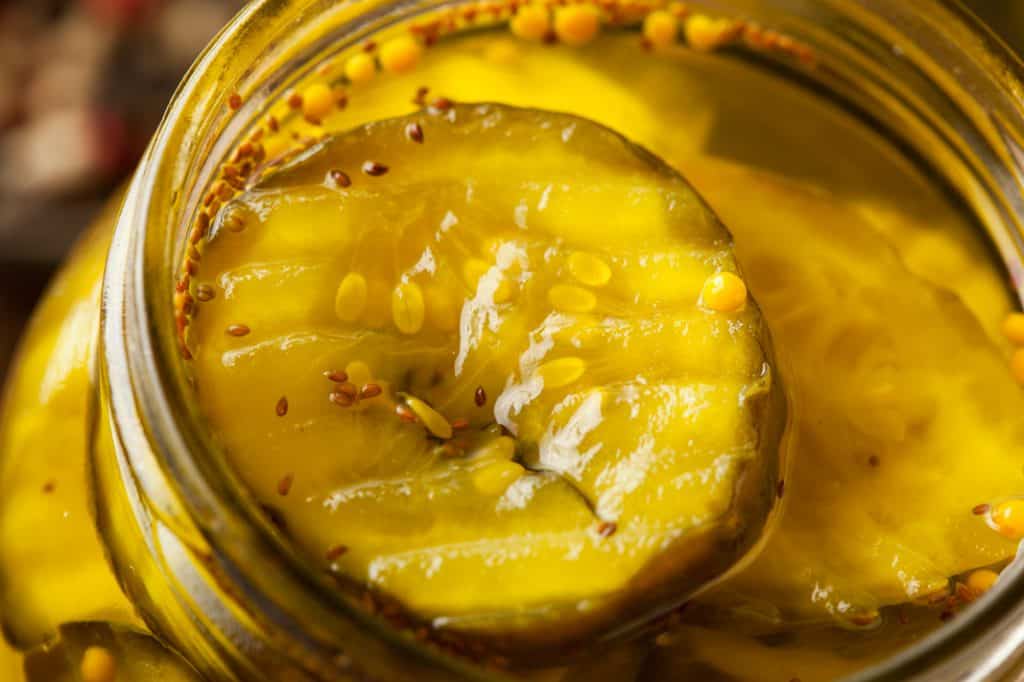
Table of Contents
What is pickling?
Pickling is a process of using fermentation to preserve food. Foods that are pickled include vegetables, fruits, meats, fish, dairy and eggs.
Centuries ago, young homemakers were judged for their ability to produce a tasty pickle.
Mothers carefully handed down their prized pickle recipes from one generation to the next.
Cucumbers are one of the most commonly pickled vegetables and are mainstay of meals.
In this guide, I will be discussing some important pickle-related FAQs and also share a simple dill pickle recipe.
Benefits of pickles
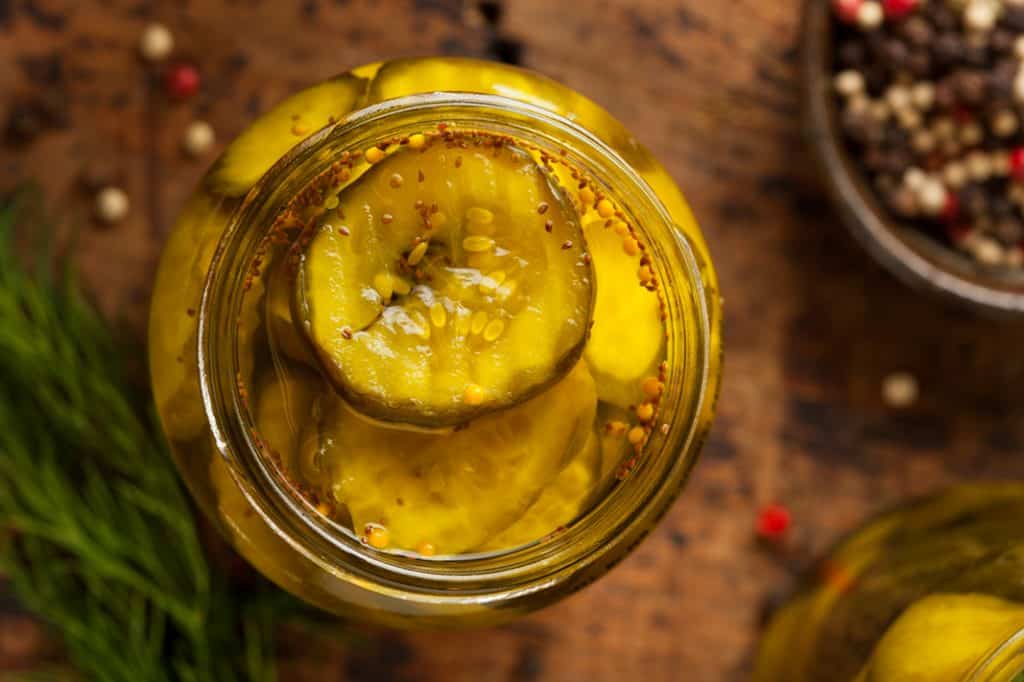
When we talk about the benefits of pickles we are only talking about fermented pickles and not the canned ones.
All fermented pickles boast a wide range of benefits. In addition to their crunchy taste, they help the body absorb vitamin C and iron.
Their probiotic content is great for digestion and they are even potentially cancer preventative. It is said that even the great philosopher Aristotle had praised pickles for their health benefits.
Pickles are great food during winter
Right since the early times, pickled veggies were usually made during the summer and fall months so they would be ready by wintertime when vegetables were scarce.
They helped add flavor, color, and texture to otherwise drab meals. Today, most of us eat pickled vegetables all-year-round but eating them in winters is especially recommended since, during this time, the body craves red meats and animal proteins. These foods can be difficult to digest so it is a good idea to add pickles to the diet during winters.
Homemade fermented pickles are extremely rich in fiber; they increase bowel motility and prevent constipation caused by red meat and other animal proteins.
Probiotic-rich pickles enhance immunity
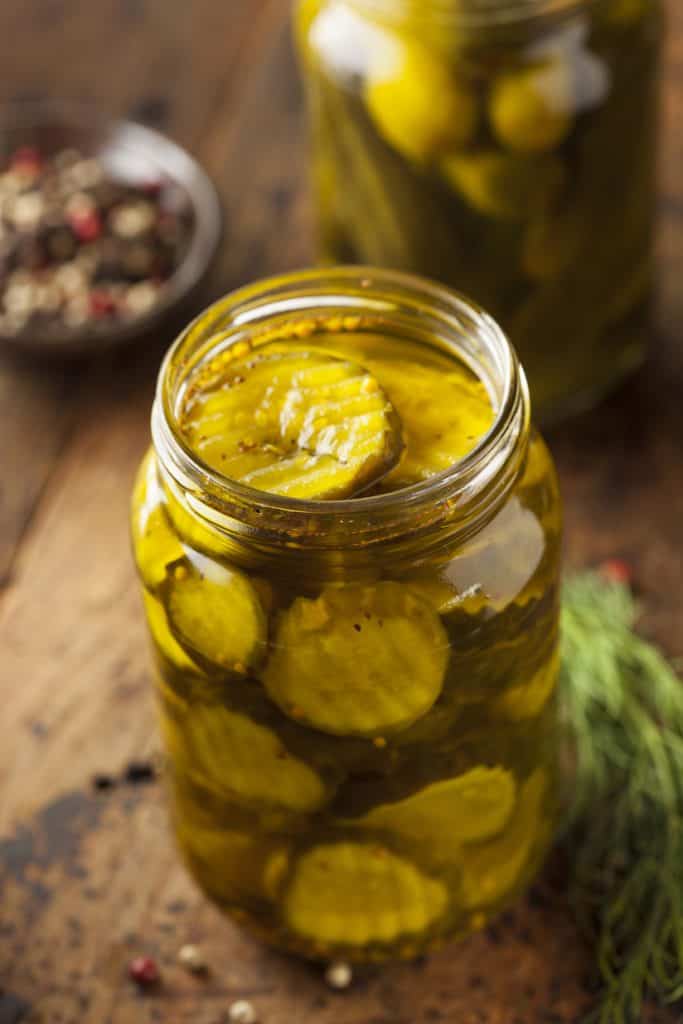
Fermented vegetables and pickles are rich in beneficial bacteria like lactobacillus acidophilus and other healthy bacterial strains. These enhance immunity and prevent bad bacteria from colonizing the intestines and causing diseases.
Eating pickles can help prevent seasonal colds, coughs, and flu. Today, scientists are also studying the role of probiotics in cancer-prevention.
Analysis of pickled cabbage and dill has shown that just 1 gram of pickle juice, pickle relishes or dill can provide us with nearly 800 million bacteria that help maintain gut health, aid digestion, and promote overall health and well-being.
The fermentation or pickling process enhances food quality and makes raw vegetables easily assimilable. They activate digestion so that there is no loss of appetite.
Eating fermented foods like pickles replenish intestinal flora that is diminished by the acid properties of a diet high in meat and sugar.
They are rich in vitamins
Dill and other pickles are extremely rich in B vitamins, vitamin C, as well as vitamins A and K.
Some studies indicate that consuming diets high in fermented vegetables with their beneficial enzymes, vitamins, and trace minerals could provide an anti-carcinogenic effect. Moreover, these vitamins can also benefit the skin by reducing signs of premature aging.
Print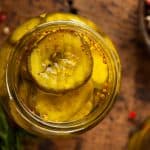
Dill Pickles Recipe
- Total Time: 15 minutes
Description
Making dill pickles at home is quick and easy. Here is a simple recipe.
Ingredients
- large pickling cucumbers of preferably the same size
- ½ lb of pickling salt per gallon of water
- for hard and crunchy pickles add a little bit of alum (optional)
- spices – turmeric, garlic, celery seeds, or mustard (optional).
Instructions
- Select large pickling cucumbers of preferably the same size. Avoid table or slicing cucumbers. You can also use gherkins. Make sure you use only unwaxed cucumbers and use them as soon as possible after harvesting.
- Soak the pickling cucumbers in water overnight.
- Next, wash them thoroughly. Remove the blossoms and slice off the blossom ends.
- Traditionally, you should make dill pickles in barrels. However, these days, most people use glass jars or mason jars for making dill pickles. As always: use only stoneware, glass, enamel, stainless-steel, or non-stick pans and food-grade containers and utensils for any fermentation recipe.
- Place a layer of dill, about one inch deep, at the bottom of the barrel and then place three layers of sliced pickles over the dill.
- Again add a layer of dill over these pickles and repeat the layer of pickles as in the first instance.
- Continue this operation until the barrel is almost filled leaving sufficient room for the brine.
- Make the brine using quality salt and distilled water. I recommend using granulated pickling salt or canning salt instead of table salt which tends to make the brine cloudy and could darken the pickles.
- Use about ½ lb of salt per gallon of water. Also use fresh, distilled water; never use hard water as it could negatively impact the curing process. Brine made with good quality salt and fresh distilled water will yield natural home-cured dill pickles.
- After the brine has been placed on the pickles and dill, leave them in a cool place and let them cure for about a month. Ensure that the surrounding temperature is moderate – not too hot or cold.
- If you want your pickles to be hard and crunchy, add a little alum to the brine. You will need a piece about as big as an egg for a barrel size of dill pickle. If you prefer natural, softer pickles, avoid adding the alum.
- You can add certain spices to the dill pickles such as turmeric, garlic, celery seeds, or mustard. Never use ground spices. Always use whole spices as ground spices may make the brine cloudy.
- Prep Time: 15 minutes
- Category: Fermented Foods
- Method: Fermentation
How long does it take to make dill pickles?
There are two varieties of dill pickles; the overnight ones and the traditionally fermented ones.
Overnight pickles are ready within 24-48 hours and the lactic acid percentage in the brine reaches a concentration of about 0.3 to 0.6%.
Genuine dill pickles that are traditionally fermented at room temperature take about 4-6 weeks or until the lactic acid percentage has reached 1-1.5% acidity.
Pickle nutritional content
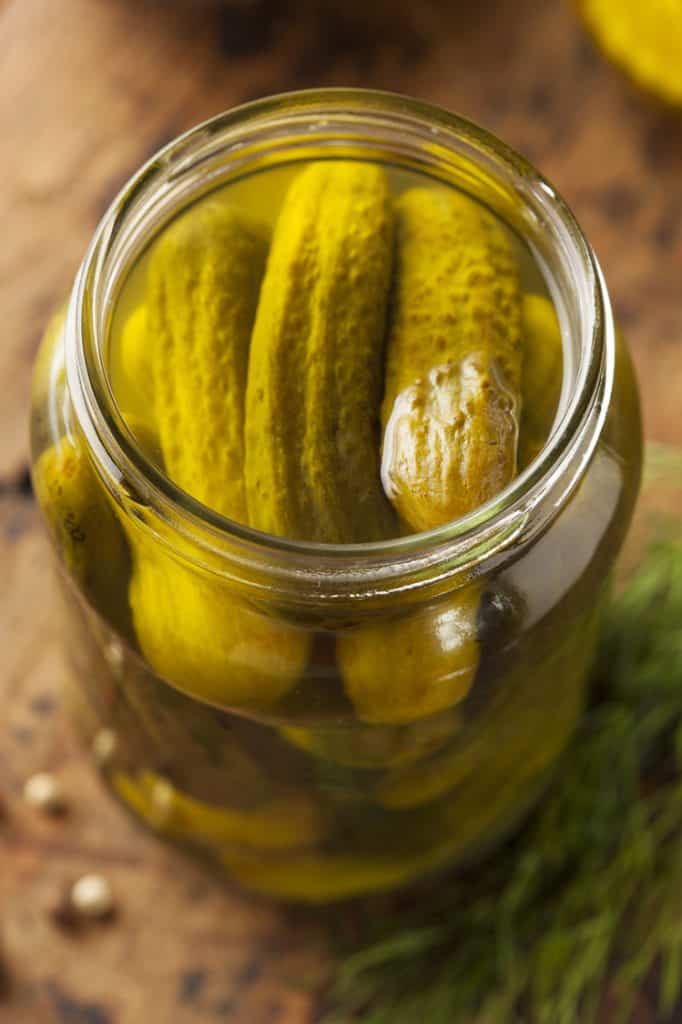
Here is a table showing the nutritional content of dill pickles with cucumbers for 100 grams or 3.5 ounces
| Water (grams) | 95.1 |
| Energy (cal) | 15 |
| Protein (grams) | 0.9 |
| Fat (grams) | 0.1 |
| Calcium (milligrams) | 25 |
| Phosphorus (milligrams) | 27 |
| Iron (milligrams) | 1.1 |
| Sodium (milligrams) | 5.7 |
| Potassium (milligrams) | 160 |
| Vitamin A (International units) | 248 |
| Thiamine (milligrams) | 0.03 |
| Riboflavin (milligrams) | 0.04 |
| Niacin (milligrams) | 0.2 |
| Vitamin C (milligrams) | 11 |
FAQ
Are pickles good for you?
The process of fermentation increases the shelf-life of the food and you get to eat these delicious and nutritious foods all year round.
You can pickle a large batch of harvest so that you can use them for months. Eating pickles can give you a healthy dose of probiotic bacteria that help improve digestion and overall health.
The healthy colonies of bacteria and yeast can also fight infection, improve immunity, and minimize digestive distress.
Since fermentation breaks down the pickles, they are easier to digest than eating them raw. If you are not too fond of eating raw fruits and vegetables, delicious and flavorful pickles are a great way to eat more dill and cucumbers regularly.
Pickling also enhances the texture, flavor, and taste of raw cucumbers. So pickles are good for general wellbeing as well as your pocket as you can eat pickles all year round even when vegetables or produce gets expensive in the winters.
Do pickles go bad?
When you follow fermentation recipe properly, you can expect to get delicious and healthy dill pickles. When stored properly, pickles can last for months, even years, without or with refrigeration.
However, you must always inspect the pickles visually. If you see any mold growing on them, discard them right away. If you have kept pickles in cold storage and still see mold, then something has gone wrong during pickling and you must throw the batch out.
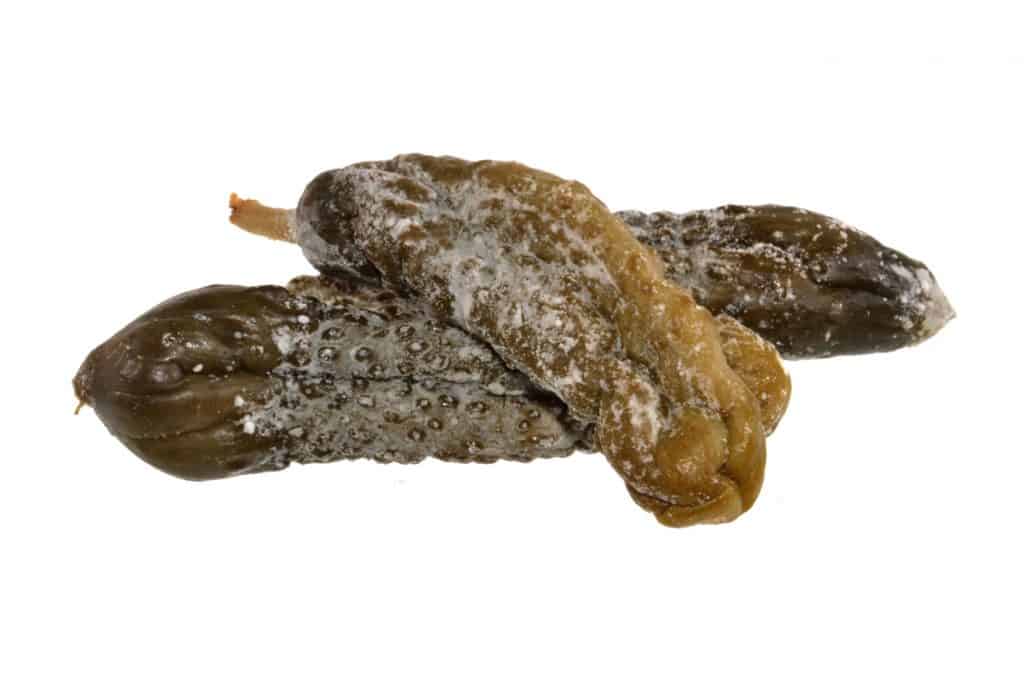
Sometimes, pickles tend to become dark in color. This is quite normal and does not mean that the pickles have gone bad.
Also, sometimes, mold can start to grow right away on the pickles and all you need to do is to skim it off. The brine and pickles underneath the mold may still be good to eat. So have a taste. Does it feel right? Is the pickle crunchy? Is the taste tangy and sour without being pungent or repulsive? So use your senses. Open the jar and have a sniff. Is the smell off?
Some pickles tend to smell pungent but their taste is still great. So it does not necessarily mean they have gone bad. At the same time, you must be able to know when the pickles give a foul or decomposing odor. If this is the case, discard the pickles someplace where no animal can consume them.
Another leading indicator that pickles have gone off is sliminess. Good fermentation should not yield slimy pickles. The texture should ideally be crunchy. If the sliminess is pronounced, there may be bacterial contamination and you must discard the batch right away.
What is the calorie content of pickles?
Dill pickles have high water content and very low calorie-content. They contain 93-95% water and only about 10-19 calories per 3 ½ ounces. However, if you are watching your weight, even this small calorie content can quickly add up. So do not go overboard with pickle consumption!
Are pickles keto?
According to The Everything Keto Cycling Cookbook by Lindsay Boyers, pickles and pickle juice are rich in calcium, iron, phosphorus, magnesium, and sodium. These electrolytes are also found in sports drinks which also contain a ton of sugar that Keto dieters avoid.
Thus, drinking dill juice after exercise can replenish lost electrolytes and keep a Keto dieter hydrated without the carbs and sugars that sports drinks contain.
Also, in Keto Gatherings by Kristie Sullivan, the author recommends dill pickles as the perfect low-carb keto snack but only as long as they do not contain any sugar.
How long do pickles last?
Pickles can easily last for 1-2 years with or without refrigeration. However, you must make sure that the taste, smell, and appearance of the pickles ‘feel’ right to you. If any of these parameters feel ‘off’ it is best not to risk it and discard the batch.
Why do pregnant women crave pickles?
Pregnant women crave pickles and that is mainly due to their salt content. During pregnancy, the body needs to produce 40% more blood than normal to feed the placenta and the main ingredient to maintain blood level is salt which is found in pickles. So those 2 a.m. pregnancy cravings for pickles are justified indeed.
How long do pickles last unrefrigerated?
Pickling is the traditional process of extending the shelf life of vegetables and also preserving their nutritional content. Pickles keep well unrefrigerated for months, even up to a year, and in the early days when refrigeration hadn’t yet been invented, pickling kept families eating vegetables through the long winters.
Conclusion
Dill pickles may be the staples of deli lunches but they have a distinguished history.
Their roots can be traced back to 4400 BC Mesopotamia where cucumbers were first introduced to brine. Later, they traveled to Greece, Egypt, and Rome.
In addition to their crunchy taste, they help the body absorb vitamin C and iron better. Even the great philosopher Aristotle praised pickles for their health benefits.
Napoleon carried them for his army and George Washington grew a prized collection of over 400 varieties. So, the next time you decide to make dill pickles at home, consider yourself in good company!
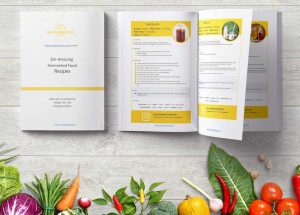
Leave a Reply